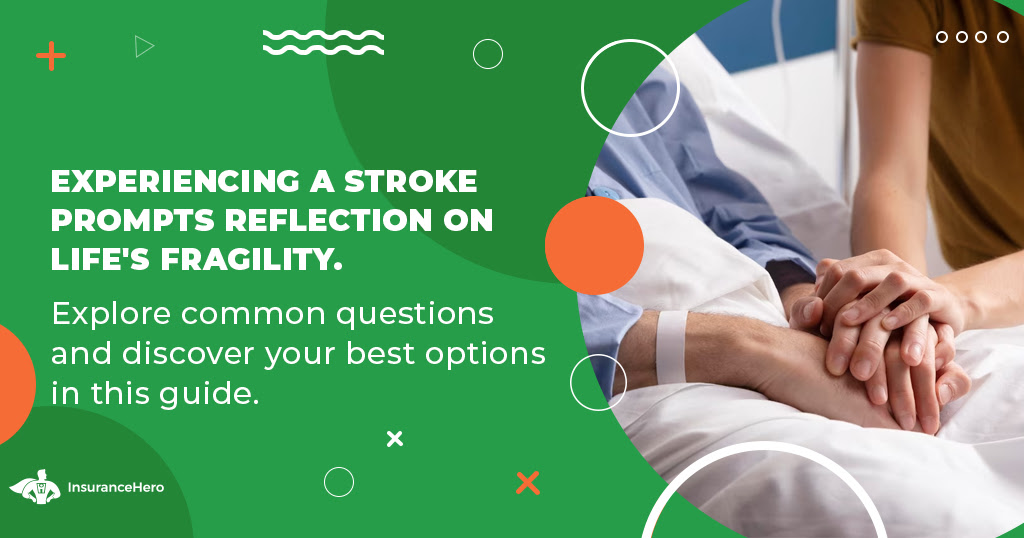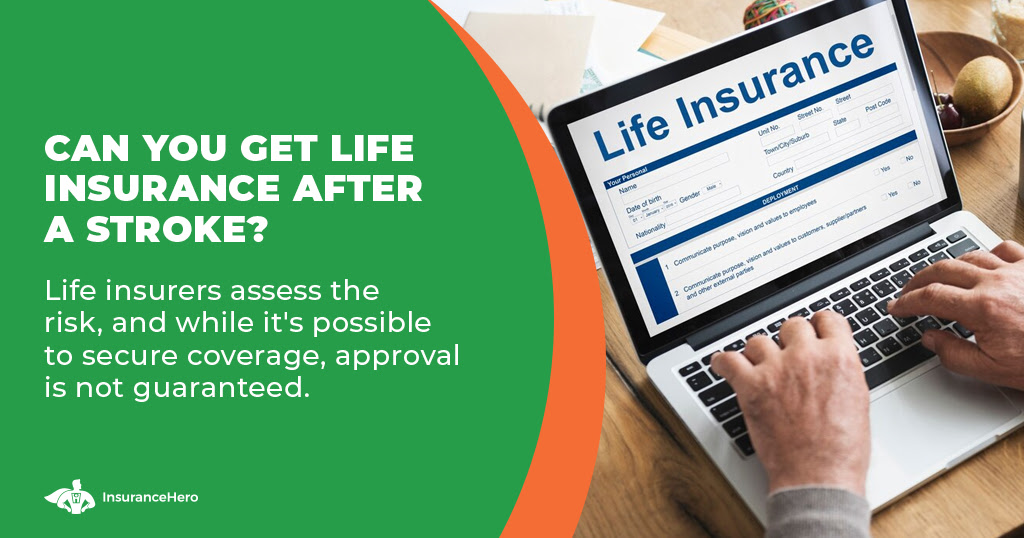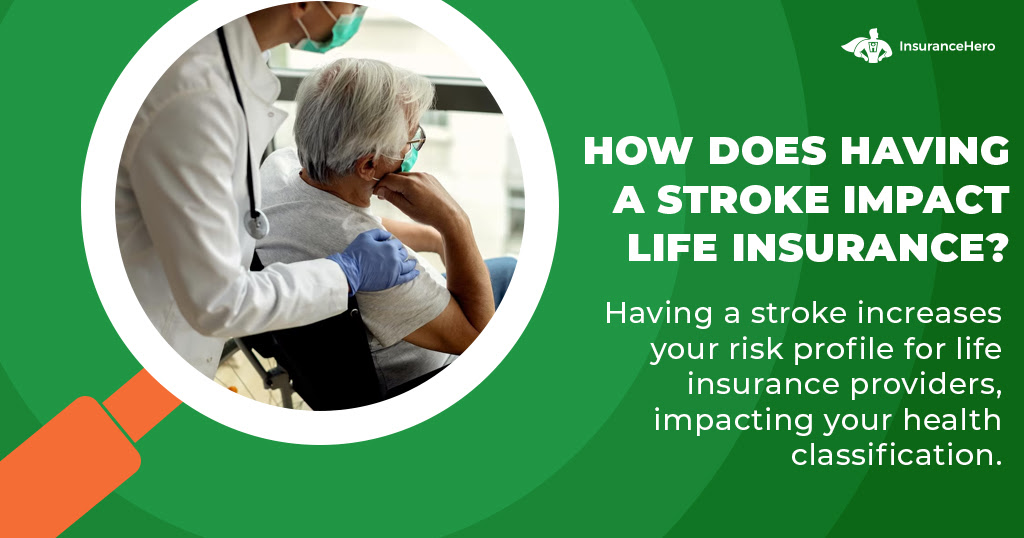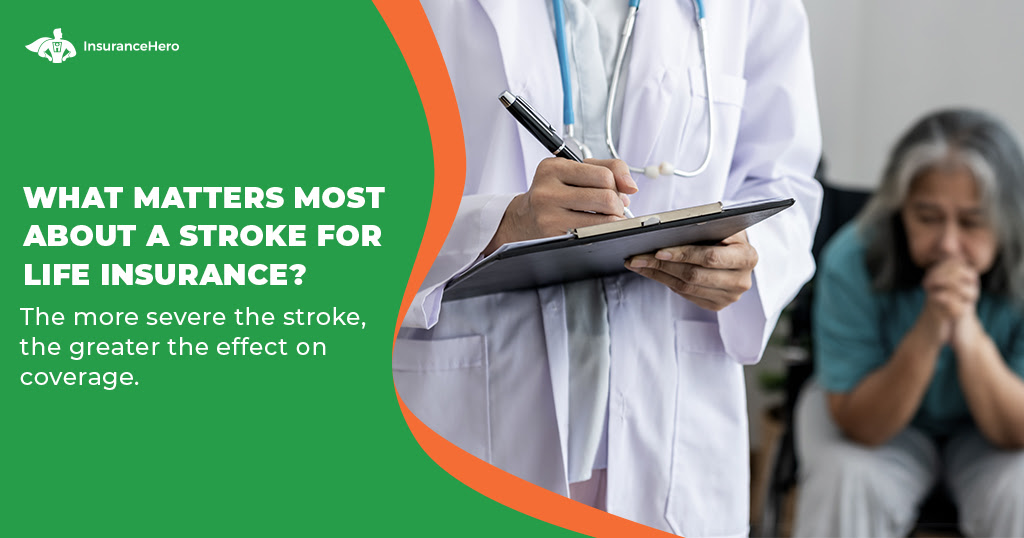Is It Possible To Get Life Insurance After A Stroke?

Few things bring the fragility of life and the inevitability of mortality into focus quite like a major health event.
Strokes are one of the most common, sudden, unpredictable, and terrifying experiences you can have seemingly out of the blue. They make you rethink your life and consider the future and what it might look like without you.
If you’ve had a stroke, either recently or sometime in the past, you might be wondering whether or not you can get life insurance to help secure the future of your family if you have another.
Compare Quotes From The UK’s Top Providers, Completely Free Quote Service, Save Money Now

Can You Get Life Insurance After a Stroke?
The first and most important question most people ask after a stroke – related to life insurance, at least – is whether or not they can get coverage.
After all, life insurance is a gamble on the part of the insurance provider. They provide a guaranteed payout if you pass away during the covered term but take your premiums in exchange for nothing if you outlive your term.
The worse your health, the more likely you are to pass, and the more likely they are to have to pay out.
Having a stroke means there’s something wrong with your health. You’re more likely, statistically, to have more strokes, including an eventual fatal stroke.
You’re also more likely to have other health problems that can be fatal. That means you’re a worse gamble for the life insurance providers; if they offer you cover, they’re more likely to have to pay out compared to other, healthier people.

So, can you even get cover? After all, if a life insurance company pays out too frequently, the maths no longer works, they can’t remain solvent, and they can’t keep providing benefits to their clients. It makes sense to deny people who are too risky to insure.
You can get life insurance coverage after a stroke. However, not all life insurance providers will approve your application, and those that may classify you in a higher-risk health group, meaning your potential death benefits may be lower and potential premiums may be higher.
While life insurance coverage can still be a great idea, it might be less of a sure thing than for comparatively healthy individuals.
Thankfully, there are a few options for getting life insurance coverage no matter what, even if you’ve had a stroke recently. Just read on to learn more.
How Does Having a Stroke Impact Life Insurance?
Having a stroke is an adverse health event. It’s something dangerous that can potentially be fatal, and if you survive it, it can indicate the possibility of future events that can be fatal.
As mentioned, life insurance providers will view you as a riskier person to insure. The chances of having to pay out death benefits to your beneficiary once you have had a stroke are higher than they were before you had a stroke.
But it’s not all so cut and dry. Many factors go into the math behind life insurance policies, which we’ll discuss a little later.

In terms of the life insurance coverage you can get, how does having a stroke impact it?
UK life insurance providers may change their view on your health after a stroke. This is because assigning health categories can change from one provider to another.
But the basic pattern usually stays the same – for instance, you might notice these familiar groups:
- Superior Health: This group is for people in great health. Even if you can control one or two minor health issues, you still have a shot at this level. We’re not talking about people who are at their fitness peak, but usually, it’s for those who are a great example of good health.
- Excellent Health: This group is for people who are typically in good health with a few well-managed health issues. These people might not be top-tier healthy, but they’re usually in the healthier part of society.
- Good Health: This group consists of many people who are usually healthy but could have some health issues under regular control. If you’ve got “health troubles” in your family, like heart disease or cancer, you might be in this category because these health problems often run in families.
- Standard Health: This is a catch-all group that covers all kinds of health conditions. Think of people who live healthily most of the time, might not smoke, and manage their health issues well. It also includes people with a family history of major diseases.
- Rated Health: Life insurance providers in the UK use charts and tables to figure out risk based on various factors. If you don’t slip into the “Average Health” group or higher and you’re a non-smoker, you’re likely going to be in this category.
- Smoker Classification: It’s no secret that using tobacco can badly raise health risks. That’s why life insurance providers have a separate group for smokers, which usually translates to higher premiums because of the increased risk.
Often, having a stroke will knock you down a level or two and will put you firmly somewhere in the table rating selection.
As far as how this actually tangibly impacts your life insurance coverage, it can do two things. First, it can mean you’re not eligible for higher potential death benefits.
This depends on the provider; some allow you to pick your desired benefit level and calculate your premiums based on that choice. Others have graded or scaled death benefits, which may scale less if you’ve had a stroke.
Mostly, though, it’s all about the premiums. The lower your health classification – and the more recently you’ve had a stroke – the higher your premiums will be.
If you already have life insurance, you will need to inform your provider that you had a stroke. If your premiums were locked in, they shouldn’t change. If your premiums are variable, though, they’ll likely go up. If you already have cover, though, it shouldn’t be cancelled on you.
What Matters Most About a Stroke for Life Insurance?
Three things matter after you have a stroke when it comes to life insurance.
The first is the kind of stroke. There are three kinds of strokes a person can have.

The worse the stroke, the greater the impact on your life insurance.
- TIA. Transient Ischemic Attacks are “mini-strokes” and are temporary and less dangerous than the other kinds of strokes. You may be able to qualify for higher-tier life insurance coverage than if you’ve had another kind of stroke and can get new coverage sooner.
- Ischemic Stroke. These are strokes caused by a blockage in a blood vessel and are by far the most common kind of stroke. They will usually knock you into a substandard health classification, and many insurance providers will want to postpone coverage for 3-12 months just in case you have another right away.
- Haemorrhagic Stroke. Rather than a blockage, this stroke is caused by a blood vessel rupturing. They are the most dangerous and severe kind of stroke and will certainly postpone your life insurance coverage and have the most severe impact on your qualifications.
The more severe your stroke, the worse the impact on your cover and qualification. You will often be forced to postpone getting new life insurance coverage, but if you already have coverage, how it’s impacted will vary.
The second factor is time. This one is pretty simple: the longer it has been since your last stroke – and the fewer strokes you’ve had – the better off you are.
The risk of a second stroke is as much as 40% higher in the first five years after a stroke; if you’ve gone five years or more after a stroke without having a second one, life insurance providers will view that as a positive.
The third factor is lifestyle changes. If you have a stroke and then do nothing to adjust your lifestyle, that’s usually considered worse than making changes like getting more exercise, losing weight, and adapting to a healthier diet.
The changes depend on where you start your health process and what your doctors recommend.
Should You Disclose Your History of Stroke?
Yes.
Alright, we’ll expound. Your life insurance provider will routinely request medical records, and there’s virtually no chance you have a stroke without there being a medical record of it. Your provider will find out, one way or another.
If you fail to disclose that you had a stroke and receive life insurance cover under false premises, your cover will usually be cancelled as soon as the provider finds out.
Furthermore, if you have a stroke and don’t disclose it, and somehow your provider doesn’t find out, it puts your beneficiaries in a bad situation.
If you pass away and your beneficiaries file a claim to receive your death benefits, the provider will look into your medical history and will usually discover the stroke.
If they find it wasn’t disclosed, they can consider it fraud and use it to deny your death benefits. It renders your life insurance cover worth nothing.

Always disclose health events, even if it raises your premiums and worsens your coverage, because it’s still better than being denied entirely.
How Can You Improve Your Life Insurance Cover After a Stroke?
As mentioned above, a stroke will worsen your health classification. However, two primary things can improve your life insurance coverage: time and lifestyle changes.
The longer you go after a stroke without having another, the better your classification will be. The five-year milestone is the most significant.
Lifestyle changes are the biggest factor to help minimize the damage – both to your body and to your life insurance – caused by a stroke.

As long as you work with doctors to improve your general health and lifestyle and keep in open communication with your life insurance provider, you should be able to bounce back relatively quickly.
Having a stroke is a permanent event, though, so you will never be able to reach the highest levels of preferred health classification after a stroke.
Do You Have Other Options for Life Insurance After a Stroke?
In cases where your general health is already fairly bad, a stroke can result in denied applications from many of the major life insurance providers. It can feel devastating not to be able to obtain cover after a stroke, but there are always some options.

You can look into:
- Guaranteed Acceptance Life Insurance. Life insurance offers a simple way to safeguard financial security for those you love. An example of this is “Guaranteed Acceptance Life Insurance,” a choice specially designed for people with serious health issues like stroke. The unique thing about this option is that you don’t need to go through a medical check-up. This means nearly anyone can get this insurance, even with a history of health problems – a standout feature. Remember that you’ll probably face a higher price tag and less coverage. So, this is a handy alternative if you’ve been having trouble getting other life insurance due to your health.
- Specialist Providers or Tailored Policies. UK insurance companies are known for covering people with significant health conditions, including stroke. They offer policies you can tweak based on a person’s stroke results. However, the costs and details of coverage can change based on the insurance company and the individual’s health facts.
- Group Life Insurance. If your job provides “Group Life Insurance,” it’s something to consider. These group policies usually have easier approval checks, and the risks are shared among the group, leading to better risk profiles for the group members. However, remember that the amount of protection and how stroke influences the policy rules can differ for each policy. So, I’m talking about reviewing your options before settling on your final choice.
Regardless, there are always some options if you have a stroke.
Finding the Best Life Insurance Cover Provider
Finding cover, especially if you’re panicking after a stroke, can be a challenge. You want to provide for your loved ones after you’re gone, but so many insurance providers make it difficult to qualify after a life event like a stroke. Fortunately, you have options.

The best option is to simply fill out our form. We can provide you quotes from the UK’s top life insurance providers all at once.
Even after a stroke, many will offer you some form of cover, and when you get all of your offers in one nice package, you can easily compare them and pick the best cover for you.
Plus, we’re always standing by to help. Fill out our short form to get a free quote today. It takes less than 60 seconds to get started.
Steve Case is a seasoned professional in the UK financial services and insurance industry, with over twenty years of experience. At Insurance Hero, Steve is known for his ability to simplify complex insurance topics, making them accessible to a broad audience. His focus on clear, practical advice and customer service excellence has established him as a respected leader in the field.


